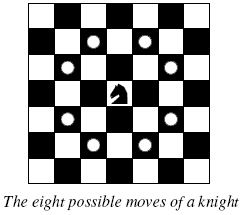[POJ2488] A Knight's Journey
Description
Background
The knight is getting bored of seeing the same black and white squares again and again and has decided to make a journey
around the world. Whenever a knight moves, it is two squares in one direction and one square perpendicular to this. The world of a knight is the chessboard he is living on. Our knight lives on a chessboard that has a smaller area than a regular 8 * 8 board, but it is still rectangular. Can you help this adventurous knight to make travel plans?
Problem
Find a path such that the knight visits every square once. The knight can start and end on any square of the board.

Input
The input begins with a positive integer n in the first line. The following lines contain n test cases. Each test case consists of a single line with two positive integers p and q, such that 1 <= p * q <= 26. This represents a p * q chessboard, where p describes how many different square numbers 1, . . . , p exist, q describes how many different square letters exist. These are the first q letters of the Latin alphabet: A, . . .
Output
The output for every scenario begins with a line containing "Scenario #i:", where i is the number of the scenario starting at 1. Then print a single line containing the lexicographically first path that visits all squares of the chessboard with knight moves followed by an empty line. The path should be given on a single line by concatenating the names of the visited squares. Each square name consists of a capital letter followed by a number.
If no such path exist, you should output impossible on a single line.
Sample Input
3
1 1
2 3
4 3
Sample Output
Scenario #1:
A1
Scenario #2:
impossible
Scenario #3:
A1B3C1A2B4C2A3B1C3A4B2C4
Source
TUD Programming Contest 2005, Darmstadt, Germany
题解
题目大意: 任选一个起点,按照国际象棋马的跳法,不重复的跳完整个棋盘,如果有多种路线则选择字典序最小的路线;否则输出“impossible”。
按字典序枚举每一个点作起点即可。
#include<iostream>
#include<cstdio>
#include<cstring>
using namespace std;
const int N=26,fq[9][2]={{0,0},{-2,-1},{-2,1},{-1,-2},{-1,2},{1,-2},{1,2},{2,-1},{2,1}};//注意字典序
int p,q,pq,Ansx[N],Ansy[N];
bool G[N][N],flag;
bool Ok(int x,int y)
{
if(x<1||x>q||y<1||y>p) return 1;
return G[x][y];
}
void Dfs(int x,int y,int step)
{
if(flag) return;
Ansx[step]=x,Ansy[step]=y;
if(step==pq) {flag=1;return;}
int nx,ny;
for(int i=1;i<=8;++i)
{
nx=x+fq[i][0],ny=y+fq[i][1];
if(Ok(nx,ny)) continue;
G[nx][ny]=1;
Dfs(nx,ny,step+1);
if(flag) return;
G[nx][ny]=0;
}
}
void Print()
{
for(int i=1;i<=pq;++i) printf("%c%d",Ansx[i]+64,Ansy[i]);
puts("\n");
}
int main()
{
int T; scanf("%d",&T);
for(int i=1;i<=T;++i)
{
flag=0; memset(G,0,sizeof(G));
scanf("%d%d",&p,&q),pq=p*q;
for(int j=1;j<=q;++j)
{
for(int k=1;k<=p;++k)
{
G[j][k]=1;
Dfs(j,k,1);
if(flag) break;
G[j][k]=1;
}
if(flag) break;
}
if(flag) printf("Scenario #%d:\n",i),Print();
else printf("Scenario #%d:\nimpossible\n\n",i);
}
return 0;
}
本文作者:OItby @ https://www.cnblogs.com/hihocoder/
未经允许,请勿转载。


 浙公网安备 33010602011771号
浙公网安备 33010602011771号